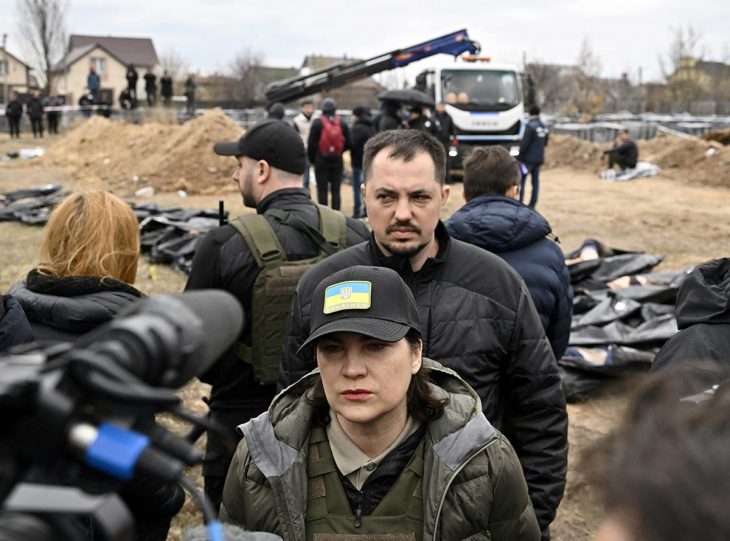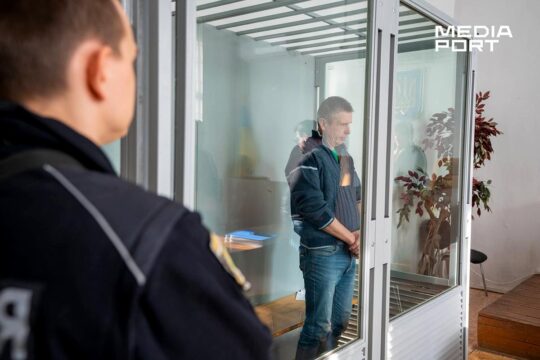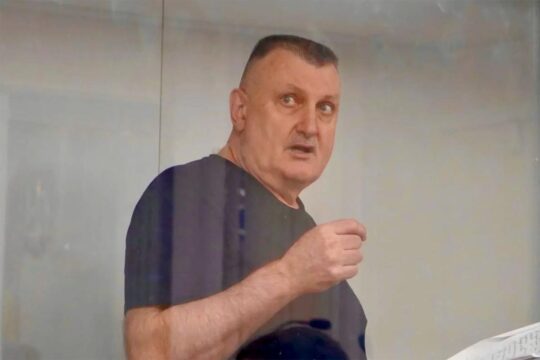“We were ordinary people,
We just wanted to live,
For the children to laugh
Ordinary, not Nazis,
Simple and hard-working
We just wanted to live,
But there are flowers on our graves"
These are the words of a young musician from Bucha that we will call Ievhen (his name has been altered). Shielding the capital Kyiv, Bucha has suffered greatly since the Russian invasion began on February 24. According to Ukrainian Prosecutor General Iryna Venediktova (see box), at least 410 residents have been killed since then by the occupying forces.
TeleCanal 34: The peaceful citizens of Bucha were not prepared for war…
Ievhen: I could not have imagined that the war in the east of the country [started in Donbass in 2014] would reach the Kyiv region. And it was us, the residents of Bucha, who were the first to hear the rumbling of the helicopters. The first strike was near Hostomel airport. We thought it would stop, but it got worse every day. We have an old family house there. The ceiling was falling in pieces under the frightening, unreal sound of the fighter planes. They were flying very low, literally right above us. I was with my loved ones - my mother who doesn't walk, my sick sister and her husband.
Did you think about evacuating your family? After all, the population of Bucha district was gradually evacuated during March…
Unfortunately they were not evacuated. All my close relatives have serious illnesses, so they are unable to walk even five kilometres. What shocked me most, to be honest, was our neighbours. They left in a half-empty car. They did it discreetly. They saved their parrots, while sick people were left behind. At that point we had no electricity, no telecommunications, no Internet and we were not getting any information from the outside world.
Many men aged 18 to 60 were assassinated by the occupiers. How did you manage to escape?
I left the town occupied by Russian forces on the twelfth day of the war, March 7. My mother insisted a lot. From the first days, the occupiers completely looted the stores. We had only a few packets of noodles for the whole family. I knew that if I stayed, it would be worse for everyone. I went out as I was: in sweatpants. I only took my papers and my laptop. I left with the next-door neighbours - a woman, a man, and a little boy. Through the swamps, we walked to Irpin, off the beaten path. Only the locals knew the way.
How long did it take you to get to Irpin?
Half a day. But it was like half a lifetime. It's impossible to say how scary it was, a bullet could be waiting behind every tree. In Irpin, we met with representatives of the territorial defence. On the way we saw many burned houses, destroyed railroads. The train used to evacuate civilians was dynamited. Before that we had been isolated from the world, we had no idea of the extent of the destruction. As we left Irpin, we met other people leaving the city in the direction of Kyiv. Soldiers of the Ukrainian Armed Forces approached us and checked our documents. At the same time, shelling started and the military directed us to a bridge. The ground was shaking, buildings were burning, and mortars were whistling continuously from the forest. We were stumbling. Hundreds of cars had been abandoned on the Romaniv bridge - destroyed, pulverized. The word "children" was written on several of them. I had seen the same inscriptions on cars while walking in the forest. The bridge in Romaniv had been blown up on February 25. I later learned that on the day I escaped, civilians trying to evacuate the city torn apart by air strikes were killed by the occupiers near that same bridge. I was lucky.
At the crossroads behind the bridge, the soldiers started shouting at us to get down. I got scared and twisted my leg. My neighbours and I lost sight of each other and went in different directions. I also lost my laptop. I had only one thought in mind, to cross that junction that was under mortar fire. I managed to crawl through. Then a man grabbed me and put me and other civilians on a bus - women, men, children and an old grandmother. She was saying the Lord's Prayer. Everyone was afraid that the bus would be targeted on the highway, but the driver brought us closer to Kyiv. He’s a hero.
Mass killings of civilians took place in the Kyiv region. Do you know any of the victims?
There are dead and wounded among my acquaintances. I can't talk about it yet, I need time to digest it. My friends who remained under the occupation saw Bucha covered with corpses. There were people shot at close range, people burned alive under the bombardments. They speak of mass graves, of civilians buried in their gardens, of a month of starvation, without communication. The occupiers tortured children and killed sick people in front of their families. Many civilians were killed, for no reason. Absolutely everything was looted by the occupiers.
What about your family members?
I didn't hear from them for a couple of weeks. But we are in touch again. I will bring my family to Kiyv. My mother and sister are deeply depressed and disoriented, they can hardly speak. I don't want to think about what they have been through. I know that for a month they were in the house without food and medicine, without electricity, isolated. But that is what saved them.
After 2014, many displaced people from Donbass settled in Bucha, Irpin and Hostomel. It is said that the brutality of the occupiers may have been a kind of revenge on these people.
That is unlikely. There were indeed, displaced people from Donetsk living in Bucha. But [the occupiers] killed everyone indiscriminately. They destroyed everything: both the new buildings of the Irpin elite and the homes of the poorest people in Bucha.
Do you plan to go back to your native town?
I have lived in Bucha almost all my life, but I will certainly not go back. I don't see how one can live there after all the atrocities committed by the Russian war criminals. Those who stayed are mostly sick people, and they have suffered a lot mentally. They need urgent specialized help.
The national prosecutor opened an investigation into the events in Bucha (see box). Human rights defenders are gathering evidence of war crimes and crimes against humanity for international courts. What do you expect from them?
When I look at the images of Bucha and see the roads I travelled to school destroyed, the bodies of my compatriots burned in the streets, I have only one wish: that all those who allowed this inhuman massacre in 2022 be held accountable with the full force of the law.
This report is part of a series on war crimes, produced in partnership with Ukrainian journalists. It was originally published on the TeleCanal 34 website.
BUCHA AND THE “EXTERMINATION OF UKRAINIANS”
When Irpin, Bucha, Hostomel and the entire Kyiv region were liberated, more than a week ago, from the Russian forces occupation, mass killings of civilians were recorded in the liberated towns and villages. In particular, a mass grave with almost 300 people buried was found in Bucha, according to press reports. Dozens of dead bodies lay on the streets, some of them with their hands tied.
At the national level, war crimes investigations are ongoing. “Bucha was one of the polygons of the so-called ‘denazification’, or simply the extermination of Ukrainians. We already have witnesses on how these civilians were killed by Russians after simply going for groceries, medicine, for speaking Ukrainian, helping volunteers, or supporting the Ukrainian army,” said Irina Venedyktova, General Prosecutor of Ukraine on April 9. “Prosecutors of the Kyiv Regional Prosecutor's Office jointly with investigators of the Main Department of the Security Service of Ukraine in Kyiv and Kyiv region, as well as 50 experts of forensic research institutes of the Ministry of Justice of Ukraine from different regions of the country are actively documenting the war crimes committed by the Russian Armed Forces in Bucha and Borodianka,” previously stated the press services of the Prosecutor General's Office and the Security Service of Ukraine.





